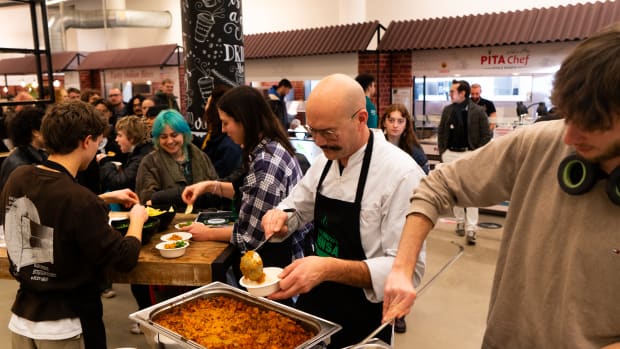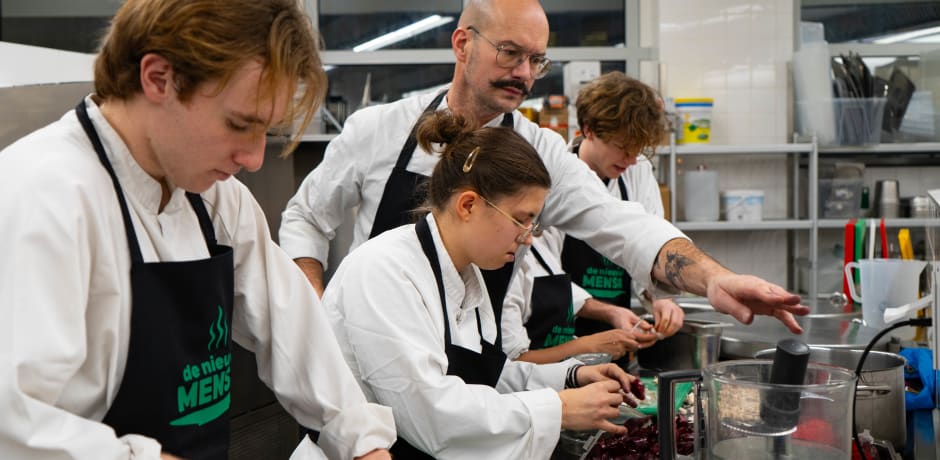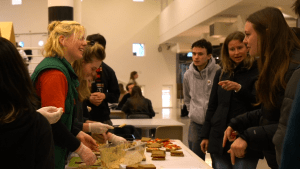
Cheap, vegan lunch, how feasible is that at the UvA?
Yesterday afternoon, UvA students from De Nieuwe Mensa are handing out free servings of sweet potato curry on Roeterseilandcampus. From 15 January 2025, the student initiative wants to offer affordable, vegan food at the UvA. How feasible is that plan?
The queue for the sweet potato curry with chickpeas and coconut milk went all the way through the canteen of Roeterseilandcampus Building H on Tuesday afternoon. Within 45 minutes, three hundred free servings of curry had been given away. It was a giveaway by The New Mensa, a group of students who want to sell vegan meals at the UvA for a few euros. A trial, to see if an affordable, vegan food stand run by students can work.
AntiCanteen
Ideas about a more affordable, vegan canteen had been alive among several UvA students for some time. For instance, a year and a half ago, students from AntiKantine handed out free sandwiches at the UvA as a protest against the canteen’s high prices. Those who now go for a meal in the UvA canteen spend around 7 to 8 euros, when they should be able to do so for a few euros, the students said. But a good alternative was easier said than done.
Until this year. Before the summer, students and Facility Services met at the UvA track Resilient societies. Guido Meijer, Facility Services’ Food & Drink project manager, had put out an assignment there to investigate how cooperation with students could be improved. Meijer: “We saw a lot of energy among activist groups of students for a better canteen, but also the difficulties and problems in realising such things. We then started talking to students and that was the start.”

Those students came from the AntiCanteen, The Green Office and Plant Based Universities, later student union Asva and the Central Student Council (CSR) also joined in. Facility Services helped the students with support and advice. Food startup accelerator Pepijn Rijks also joined to guide the students.
Menu
“De Nieuwe Mensa consists of about ten students who want to make affordable, sustainable and vegan food possible at the UvA,” says CSR member Francesco Bruseghini, involved in the initiative. “We heard from many people that selling affordable food in the UvA canteen is not possible, but we know from experience that it can be done. And we want to show that.”
De Nieuwe Mensa stands for sustainable and healthy food. The menu features nutritious meals such as pastas, curries, lentil dahls and minestrone soup. Bruseghini: “You won’t see avocado here.” The students plan to source buy their food from local farmers, although this has not yet been determined. And will there be fries on the menu? “Can be, but a bit boring and not very healthy. For us, it’s about healthy food, with which you can study more focused.”
Business plan
15 January, De Nieuwe Mensa plans start selling food in the canteen of REC H. But it is not there yet. First, a foundation has to be set up to employ cooks and waiters. A contract must also be signed with Cirfood, the UvA’s main caterer. All entrepreneurs who sell food to the UvA will pay a percentage to Cirfood for the use of facilities such as the kitchen.
Whether that contract will materialise, Liesbeth Nijhuis, Cirfood’s UvA-HvA district manager, cannot yet say. “I haven’t seen a business plan yet. The students are now handing out samples at the UvA, and we are cooperating with that by providing our kitchen.”
That financial plan does lie with Guido Meijer of Facility Services at the time, although he has not yet had time to see it. “But whether the plan is financially feasible, that is what we are trying to find out together with the students.”
He also sees De Nieuwe Mensa as an experiment to see how a new catering model works out in practice. Meijer: “This pilot project is part of a larger business plan for the future of catering at the UvA and HvA. The contract with entrepreneur Cirfood expires in two years, and then we will have to enter the market again. For us, it is also interesting to investigate the feasibility of a canteen run by students. Are students able to provide continuity? Do they attract enough custom?”
Aldi and Albert Heijn
The broad lines of the financial plans of De Nieuwe Mensa is to provide three hundred people a day with a meal for less than 4 euros. Cooks will be paid in the process. Meijer: “We from Facility Services and the students agreed on that pretty quickly. This is not the first time we are doing this kind of experiment with students, the possibility for student initiatives was already included in the agreement with Cirfood in 2016. In the beginning, there is a lot of enthusiasm, but in the end, a model with volunteers does not last.”
And what about other entrepreneurs who work in REC H’s canteen, can’t that cause odd glances if food is offered for cheaper? Meijer: “That’s part of the test. It could also be that you actually attract a new target group and more customers. Of course, we also have a duty of care to compete with other operators. But if the students can build a more successful model under the same conditions, they are free to do so. In the shopping street, you also have an Aldi and an Albert Heijn and they are both doing well too.”
Meijer considers the chances of De Nieuwe Mensa also being there on 15 January “fairly plausible”. For the students, it is a fact. PPLE student Noah Bisinger and president of De Nieuwe Mensa is certain. “We will open from 2025, initially until the summer. But we are confident that it will be a success and we will continue beyond that. And, in the near future, be able to sell affordable vegan food on other UvA campuses as well.”





